| Title | Homes and Community-based Tourism: A vision for the future |
| Author | Chanatporn Limprapoowiwattana |
Homes and Community-based Tourism: A vision for the future
The main pillars of Sustainable Development Goals emphasise the need to balance economy; society; and ecology at the global scale, encompassing both developed and developing countries. While travel and tourism can promote the Sustainable Development Goals, its sustainability aspects remain skeptical, especially during the outbreak of COVID-19 (Trupp and Dolezal 2020). At the regional level, such as in the Southeast Asian (SEA) region, it is evident that tourism plays a significant role in shaping the socio-economic development of many countries. According to Statista (2023), the travel and tourism sector of the Association of Southeast Asian Nations (ASEAN) has great potential to make significant economic contributions to the region.
Revenue in the Travel & Tourism market is projected to reach US$26.62bn in 2023. Revenue is expected to show an annual growth rate (CAGR 20232027) of 7.87%, resulting in a projected market volume of US$36.04bn by 2027.
For this reason, ASEAN and international organisations come up with important strategic plans and frameworks for reviving the travel and tourism industry after Covid-19, for example, “the post-covid19 recovery plan for ASEAN tourism” (Greenview for the ASEAN Secretariat ICT and Tourism Division 2021) and “ASEAN framework on sustainable tourism development in the post Covid-19 era” (ASEAN 2023).
Taking into account the socio-economic benefits of tourism in the SEA region, this essay proposes an alternative vision for “the future of genuine communities” in SEA countries. This vision is examined through the imaginaries of home and community-based tourism. In this essay, the term “genuine communities” is based on an explanation given by One Community (2011) as follows:
True, Genuine Community is the art and practice of being our most loving, open, and authentic selves while we honor others doing the same.
Putting “loving, open, and authentic selves” (One Community 2011) into consideration, this essay specifically focuses on these three key elements embedded within the imaginaries of local residents of Uthai Thani province in Thailand. Their imaginaries exhibit endeavors to establish the relationships between humans (the hosts and guests) and homes. Thus, many residents of Uthai Thani voluntarily participate in the development of community-based tourism by welcoming visitors to their homes. This implies that the locals have visions for cultivating and strengthening mutual understanding between people. Their initiatives can be perceived as an example of a cultural tool that supports the development of the local community and lays the important groundwork for connecting people in Thailand, the SEA region, and different corners of the world.
This essay argues that visions for “the future of genuine communities” have to be presented and understood in connection to the past and present of the community. As a result, it highlights the imaginaries of home reflecting the memories of the past and present as well as the vision towards the future of the community. Providing the readers with 18 photographs, this essay draws attention to the creative ways in which the locals use their existing cultural and historical resources, especially their homes, to attract visitors and present their “loving, open, and authentic selves” (One Community 2011). This showcases the creativity and collective imaginaries of the past, present, and future of Uthai Thani (emphasising connecting people through community-based tourism). From a broader perspective, authenticity (genuine community) can be constructed based on shared history, past experiences, and memories. It can bind the past, present, and future of SEA communities. This statement can be supported by the research of Atasoy in 2021.
Modern societies believe that authenticity belongs to premodern times, other cultures, and simpler lifestyles where human beings could be more at ease with themselves; in other words, that authenticity belongs elsewhere. (Atasoy 2021:379)
Through a set of 18 photographs, this essay presents historical elements, cultural resources, and the imaginaries of the homes of Uthai Thani residents, who voluntarily participate in the development of community-based tourism. It thus offers a new way towards the presentation and interpretation of “home”, a key essence for the development of community-based tourism. Furthermore, it visualises one of several ways homes can play a key role in constructing a vision for the future of genuine communities in the SEA region.
In the photos (below), it can be seen that homes are integrated into the touristic destination/
sites. Each of them is self-narrated and is functionalised in diverse and interesting ways, including (i) a private residence, (ii) a historical site, (iii) a space for collecting and presenting meaningful objects and sharing memories, (iv) a visitors’ residence (homestay), (v) a book store. Therefore, homes are not just residential spaces, but spaces for constructing imaginaries and creating visions for the future of genuine communities.

Local History and Cultural Museum of Uthai Thani Province (October 2023). Local History and Cultural Museum is one of the most important museums in Uthai Thani. Preserving and displaying the historical and cultural heritage of the province, this space helps establish connections between the past and present as well as shape the vision for the future of Uthai Thani.

House rafts on Sakae Krang River (October 2023). Local History and Cultural Museum of Uthai Thani Province. This photo exhibits the traditional river culture of Uthai Thani. It reflects memories of lives by the river in the past (and continues to the present).

House rafts on the Sakae Krang River (October 2023). The physical structure of the house raft community has changed over time, allowing both locals and the visitors to observe and experience livelihoods along the river during different periods.
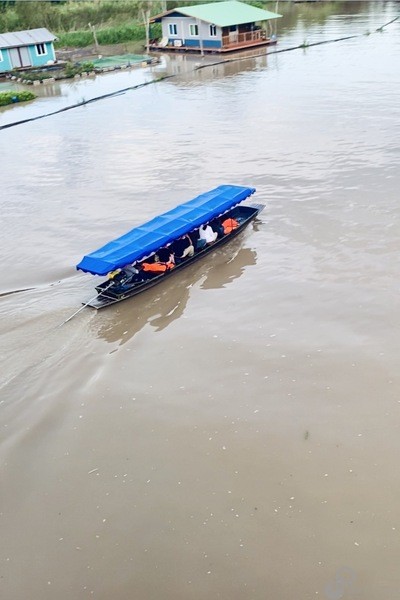
Visitors on a river cruise along the Sakae Krang River (October 2023). During the boat trip, visitors can observe life along the river and learn about the history of Uthai Thani.

House rafts and river-based cage aquaculture along the Sakae Krang River (October 2023). River-based cage aquaculture is a significant part of traditional livelihoods in Uthai Thani. It becomes one of the most important and iconic spots for community-based tourism.
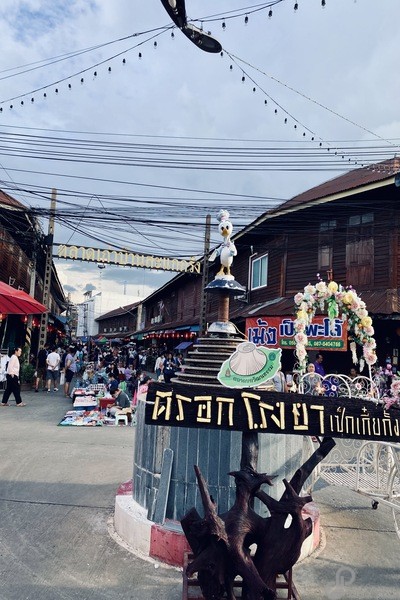
Trok Rong Ya Walking Street (October 2023). Trok Rong Ya Walking Street, a space for organising a Saturday market (Baan Sakae Krang old market), is part of the community-based tourism initiative. Operating with the concept “The street is short, but the legends are long.”, the visitors can learn about the history of Uthai Thani through exhibitions and house museums (while purchasing local products).

Baan Sakae Krang old market (October 2023). This Saturday market is part of the community-based tourism initiative. It is a place where Thai and international visitors can get to know the locals and their history, and try local delicacies/ products.
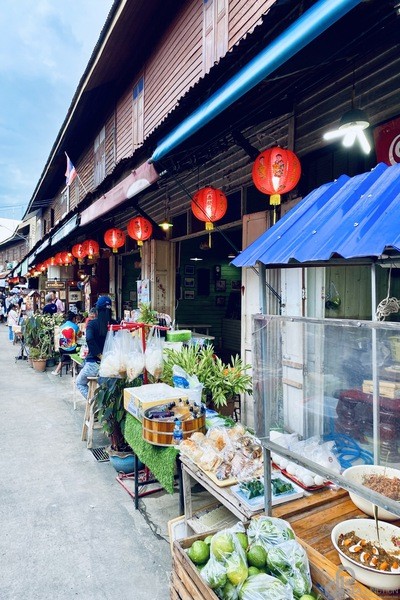
Local food stores at Baan Sakae Krang old market (October 2023). Local food stores attract visitors who want to observe and learn about the food culture in Uthai Thani.

Baan Nok Khao at Trok Rong Ya walking street (October 2023). This sign (in Thai) literally means The home of Nok Khao (name of the owner): “Telling the stories through an old house”. In this case, Baan (บ้าน) means “home”/ “house” in English. The visitors are allowed to enter this house museum free of charge.
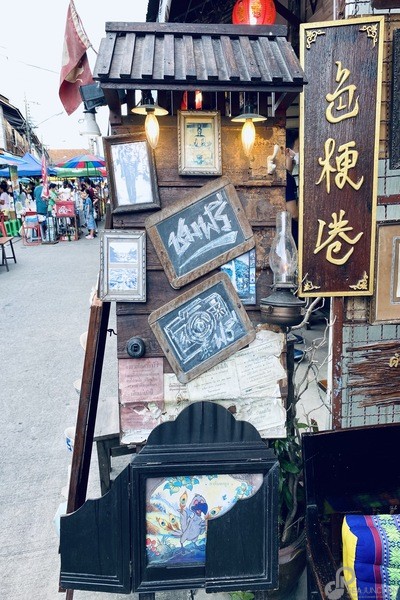
Signs in front of Baan Nok Khao at Trok Rong Ya Walking Street (October 2023). The signs (written in white) indicate that visitors are allowed to enter the house and take photos of the antique objects at no cost.
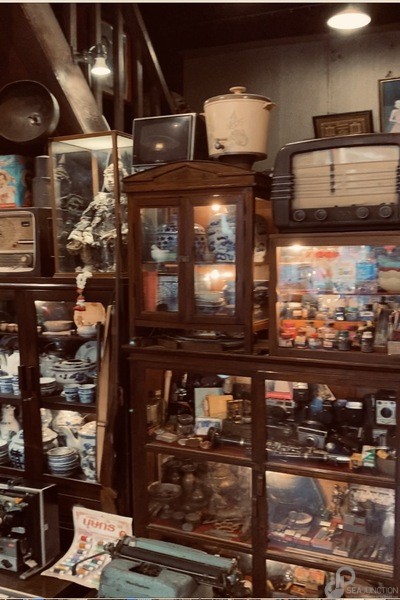
Antique pieces inside Baan Nok Khao (October 2023). The visitors are allowed to touch and take photos of the old objects, such as the camera, typewriter, Chinese abacus, Chinese porcelain, and Burmese puppet.
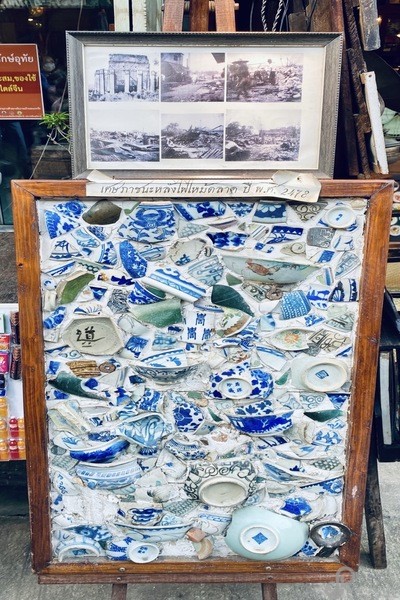
Broken pieces of Chinese porcelain in front of Baan Nok Khao (October 2023). The pieces of porcelain were collected after the market fire in 1929. They were exhibited in front of Baan Nok Khao informing the visitors about the incident (which occurred 94 years ago).
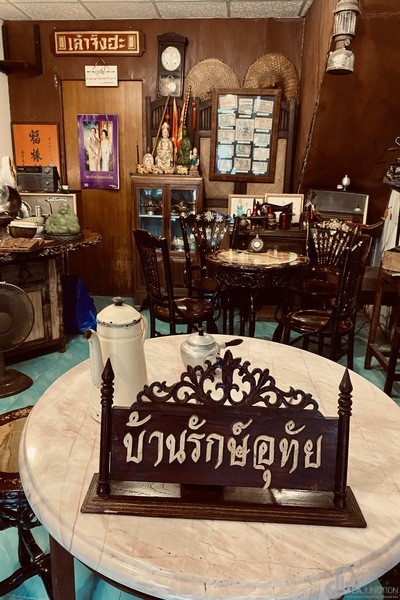
Baan Rak Uthai at Trok Rong Ya Walking Street (October 2023). This is another house museum on the Trok Rong Ya Walking Street. It is situated next to Baan Nok Khao. These beautiful antique tables and chairs illustrate how the communities in Uthai was shaped by Chinese culture and arts.
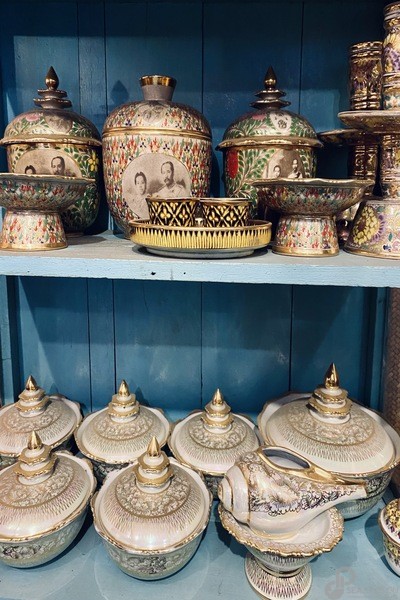
Antique porcelain in Baan Rak UThai (October 2023). These antique porcelain pieces at Baan Rak Uthai show an interesting and delicate combination between Thai and Chinese culture.
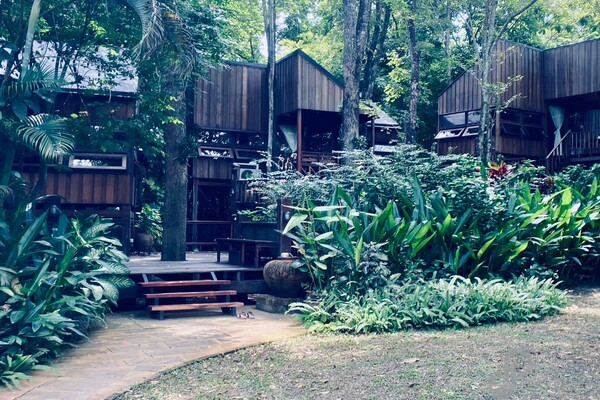
Baan Suan Chantita Homestay (October 2023). This place provides hospitable environment and peaceful atmosphere. This green space can be compared to homes inside the forest enabling the visitors to re-connect with nature. The owners put great effort to turn the area in their backyard into this welcoming and peaceful place for visitors.
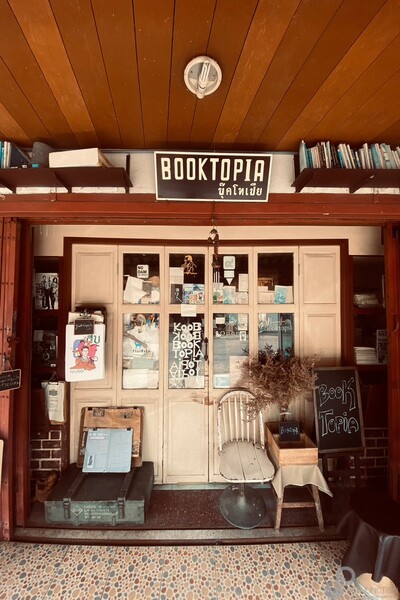
Booktopia bookshop (October 2023). This bookshop can be viewed as an intermediary space that allows locals and visitors/ travelers to get to know each other. Therefore, this place is multi-functional. It can be compared to a home for book lovers, a bookshop, and a networking space.
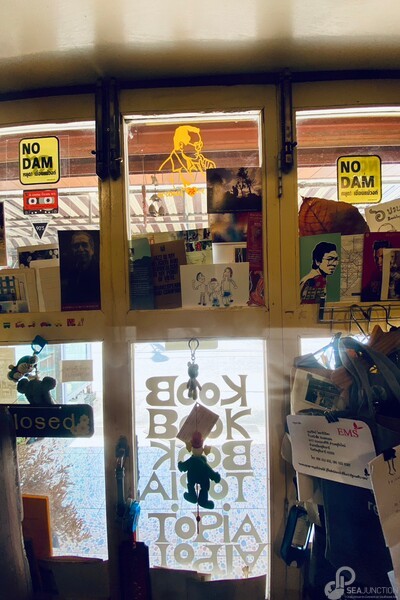
The front door of the Booktopia bookshop (taken from inside) (October 2023). This bookshop can be considered a part of an environmental conservation network. It has been actively involved in environmentally friendly events/ activities.
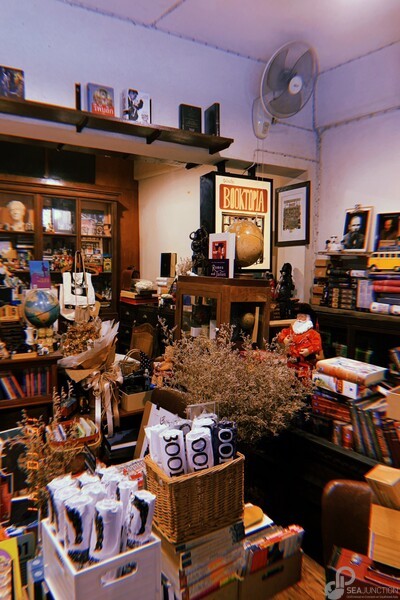
Inside the Booktopia bookshop (October 2023). There is a mixed atmosphere inside this bookshop. It gives you the sense of being in a home, a book store, a library, and a book museum.
Acknowledgements
I would like to express my sincere gratitude to the Local History and Cultural Museum of Uthai Thani Province, Baan Nok Khao, Baan Rak Uthai, Baan Suan Chantita Homestay, Booktopia Bookshop, and Uthai Thani residents for allowing me to take photos at their places and share with me their valuable memories and experiences. Their contributions to this essay is greatly appreciated.
Bibliography
ASEAN. 2023. ASEAN Framework on Sustainable Tourism Development in the Post Covid-19 Era.
Atasoy, Fuat. 2021. ‘Authenticity in Tourism’. Pp. 377–98 in.
Greenview for the ASEAN Secretariat ICT and Tourism Division. 2021. Final Study Report for the Post-Covid-19 Recovery Plan for ASEAN Tourism.
One Community. 2011. ‘What Is True Community’. True Community. Retrieved 8 October 2023 (https://www.onecommunityglobal.org/true-community/).
Statista. 2023. ‘Travel and Tourism – ASEAN’. Statista. Retrieved 13 October 2023 (https://www.statista.com/outlook/mmo/travel-tourism/asean).
Trupp, Alexander, and Claudia Dolezal. 2020. ‘Tourism and the Sustainable Development Goals in Southeast Asia’. Austrian Journal of South-East Asian Studies 1-16 Pages. doi: 10.14764/10.ASEAS-0026.
Biography:
Chanatporn Limprapoowiwattana is originally from Thailand. Currently, she is a part-time adjunct lecturer and dissertation advisor at the Faculty of Liberal Arts, Thammasat University, Bangkok, Thailand. She is also an associate member of the Centre of International History and Political Studies of Globalization, Faculty of Social and Political Sciences, Université de Lausanne, Switzerland. She earned her Ph.D. in Political Science in June 2020 from Université de Lausanne in Switzerland, with financial
support from the Swiss Government (The Swiss Government Excellence Scholarships for Foreign Scholars and Artists (2016-2020)). Her research focus centres on food philosophy, global food governance, Buddhist socio-economics, and visual methodologies. Chanatporn interested in exploring human-nature relationships and the role of transnational institutions that shape the local and global food systems. Aiming to reach a wider readership and audience, she incorporates and develops visual materials and tools such as photographs and short documentary films within my research. This is exemplified in her article The Art of Buddhist Connectivity: Organic Rice Farming in Thailand, published in Agriculture and Human Values, which illustrates how photos can serve as essential mediating tools, connecting the researcher with small-scale organic food farmers.
Organizer:
SEA Junction, established under the Thai non-profit organization Foundation for Southeast Asia Studies (ForSEA), aims to foster understanding and appreciation of Southeast Asia in all its socio-cultural dimensions- from arts and lifestyles to economy and development. Conveniently located at Room 408 of the Bangkok Arts and Culture Center or BACC (across MBK, BTS National Stadium), SEA Junction facilitates public access to knowledge resources and exchanges among students, practitioners and Southeast Asia lovers. For more information see www.seajunction.org, join the Facebook group: http://www.facebook.com/groups/1693058870976440 and follow us on Twitter and Instagram @seajunction
In collaboration with:
The JFK Foundation in Thailand was founded by H.E. Dr. Thanat Khoman, the former Ambassador to the United States, with the purpose of commemorating President Kennedy’s principles.


